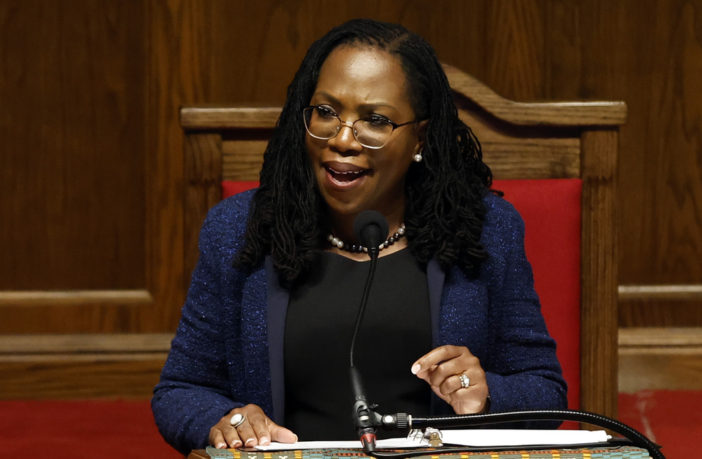By Kimberly Chandler,
The Associated Press
BIRMINGHAM, Ala. (AP) — Standing at the pulpit of the Birmingham, Ala., church where four little girls were killed by a Ku Klux Klan bomb in 1963, Supreme Court Justice Ketanji Brown Jackson said the nation must remember and own the uncomfortable moments of its past in order to move forward.
Jackson, the first Black woman to serve on the nation’s highest court, spoke at the 60th anniversary of the Sept. 15, 1963 bombing at 16th Street Baptist Church.
“Today we remember the toll that was paid to secure the blessings of liberty for African Americans, and we grieve those four children who were senselessly taken from this earth and their families robbed of their potential,” Jackson said.
She said the country should celebrate the great strides that have been made since 1963 but that there is still work to do. “The work of our time is maintaining that hard-won freedom and to that we are going to need the truth, the whole truth about our past,” Jackson said.
Jackson said she knows that atrocities “like the one we are memorializing today are difficult to remember and relive” but said it is also “dangerous to forget them.”
“If we are going to continue to move forward as a nation, we cannot allow concerns about discomfort to displace knowledge, truth or history. It is certainly the case that parts of this country’s story can be hard to think about,” Jackson said.
Jackson did not mention any of the efforts in Republican-led states to place parameters on how race is discussed in classrooms. Instead, Jackson, who was born in 1970, gave the example of how her own parents made sure, even at a young age, that she learned about what happened in Birmingham, Selma and other battlegrounds of the Civil Rights Movement.
Family and friends gather to lay a wreath at the bombing site during the 60th Commemoration of the 16th Street Baptist Church bombing Friday, Sept. 15, 2023, in Birmingham, Ala. (AP Photo/Butch Dill)
“Yes, our past is filled with too much violence, too much hatred, too much prejudice, but can we really say that we are not confronting those same evils now? We have to own even the darkest parts of our past, understand them and vow never to repeat them,” Jackson said.
Klansmen had placed a bundle of dynamite outside the church under a set of stairs on that day in 1963. The girls were gathered in a downstairs washroom before Sunday services when the blast exploded at 10:22 a.m. The explosion killed 11-year-old Denise McNair, and Cynthia Wesley, Carole Robertson, and Addie Mae Collins, all 14. A fifth little girl, Sarah Collins Rudolph, the sister of Addie Mae, was in the room and was severely injured — losing an eye to the explosion— but survived.
The bombing came during the height of the Civil Rights Movement, eight months after then-Gov. George Wallace pledged, “segregation forever,” and two weeks after the Rev. Martin Luther King Jr. delivered his iconic, “I Have a Dream” speech in Washington.
Hundreds of people, Black and white, filled the church Sept. 15 for the remembrance. The church bell tolled four times as the names of the girls were read. The crowd also stood to honor Rudolph, the “fifth little girl” in the room that day.
U.S. Rep. Terri Sewell, D-Ala., said they were standing on solemn ground where the senseless deaths “awakened a slumbering consciousness of America and galvanized the Civil Rights Movement.”
For many, Jackson’s presence at the church was a poignant moment. Sewell and other speakers on Sept. 15 said the lives of the four slain Black girls are in a way intertwined with Jackson’s. They said she is the embodiment of what civil rights foot soldiers in the 1960s dreamed would be possible, and the Voting Rights Act and other gains that followed paved the way for the first Black woman on the Supreme Court.
“It has been 60 years in the making. Dr. Martin Luther King said that these girls would not have died in vain and our speaker, Ketanji Brown Jackson, is the personification of that today. She is that hope,” former U.S. Sen. Doug Jones said.



